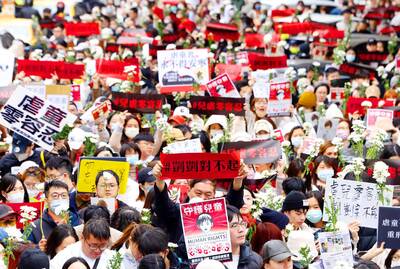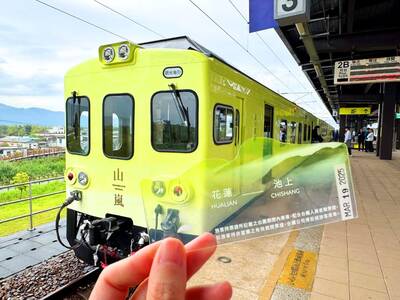The recent US report on China's military power and the growing military imbalance across the Taiwan Strait is aimed at shattering the idea that the cross-strait impasse can be solved peacefully, analysts said yesterday.
The analysts came to this conclusion after interpreting the US report's message and the Chinese government's reactions to it, adding that the report might dampen unificationist elements within Taiwan.
While the cross-strait military imbalance has been a matter of concern for the US, it was conveyed in a different way in the report, said Tsai Ming-yen (
"Unlike the former [US military] reports that merely state the amount of Chinese weapons targeted at Taiwan, the functions and the operations of its weapons are also given attention in this year's report," said Tsai, adding "we should read from this difference that China's military strategy is based on bringing about unification with Taiwan."
"Another point that wasn't mentioned so clearly in the former reports is the China's two-pronged strategy to against Taiwan," Tsai said, referring to a strategy of "persuasion and coercion" as stated in the Pentagon report.
The US doesn't consider China's rise as merely an opportunity to tap its vast market, as its foreign policy clearly shows. This includes asking the EU not to lift an arms embargo against China, blocking Israel's sale of drone aircraft to the authoritarian giant, and enhancing its military cooperation with Japan and India, he said.
These actions prove that the US perceives a rising China as a threat, Tsai said.
"It seems that those aspects of the Chinese military threat, as spelled out in the US report, have not been noticed in Taiwan," Tsai said. "In fact, it's difficult in this country to reach a consensus on the issue because of the bitter partisan rivalry that exists here. That's why the Pentagon sought to remind Taiwan of China's `persuasion strategy' in the report."
Tsai's interpretation was echoed by Chang Kuo-cheng (
Failing to break the deadlock over the arms procurement budget symbolized the pervasiveness of "pro-China thinking" in the country, Chang said, defining such thinking as "placing China's interests before Taiwan's."
Politicians guided by this thinking prefer to pin their all hopes of resolving the cross-strait dispute on all kinds of exchanges activities with China, Chang said.
"I'm not saying that peaceful exchanges don't help the cross-strait situation. The problem is that while the politicians preach the benefits of these activities, they forget about the necessity to build up our own defense capability," Chang said.
Chang noted that by emphasizing the cross-strait military imbalance, the Pentagon wanted to give Taiwan the hint that its political dispute with China won't be easily resolved by peaceful means, given China's fast-growing military and economic clout.
"Not to pin your hopes on a peaceful settlement of the issues doesn't necessarily equal a willingness to have a military conflict," Chang said. "[Investing in defensive weapons] just means that we take the possibility of a military conflict seriously."
He also said that maintaining a sufficient military force and solidifying defense around Taiwan's borders is the report's overriding message.
The Chinese government blasted the US government shortly after the report was released, with China's Deputy Foreign Minister Yang Jiechi (
"China's fierce response to the report shows that its military ambitions -- not only against Taiwan, but also in the region -- are genuine, and that the conclusions reached in the US report are correct," said Yang Chih-heng (楊志恆), an associate professor of Southeast-Asian studies at Tamkang University.
China might think that it was inappropriate for the US to make such strong conclusions about its military expansion, as Washington needs Beijing's help in resolving the North Korean nuclear dispute, Yang said.
The report, to China's surprise, illustrated the fact that the US' China policy is one of engagement and containment, Yang said.
In view of this, the cross-strait military imbalance and Taiwan's complacence toward its defense capability are especially worrying for the US, as they are closely related to the future of that nation's influence in the region, Yang said.

Taiwan yesterday condemned the recent increase in Chinese coast guard-escorted fishing vessels operating illegally in waters around the Pratas Islands (Dongsha Islands, 東沙群島) in the South China Sea. Unusually large groupings of Chinese fishing vessels began to appear around the islands on Feb. 15, when at least six motherships and 29 smaller boats were sighted, the Coast Guard Administration (CGA) said in a news release. While CGA vessels were dispatched to expel the Chinese boats, Chinese coast guard ships trespassed into Taiwan’s restricted waters and unsuccessfully attempted to interfere, the CGA said. Due to the provocation, the CGA initiated an operation to increase

A crowd of over 200 people gathered outside the Taipei District Court as two sisters indicted for abusing a 1-year-old boy to death attended a preliminary hearing in the case yesterday afternoon. The crowd held up signs and chanted slogans calling for aggravated penalties in child abuse cases and asking for no bail and “capital punishment.” They also held white flowers in memory of the boy, nicknamed Kai Kai (剴剴), who was allegedly tortured to death by the sisters in December 2023. The boy died four months after being placed in full-time foster care with the

CHANGING LANDSCAPE: Many of the part-time programs for educators were no longer needed, as many teachers obtain a graduate degree before joining the workforce, experts said Taiwanese universities this year canceled 86 programs, Ministry of Education data showed, with educators attributing the closures to the nation’s low birthrate as well as shifting trends. Fifty-three of the shuttered programs were part-time postgraduate degree programs, about 62 percent of the total, the most in the past five years, the data showed. National Taiwan Normal University (NTNU) discontinued the most part-time master’s programs, at 16: chemistry, life science, earth science, physics, fine arts, music, special education, health promotion and health education, educational psychology and counseling, education, design, Chinese as a second language, library and information sciences, mechatronics engineering, history, physical education

The Shanlan Express (山嵐號), or “Mountain Mist Express,” is scheduled to launch on April 19 as part of the centennial celebration of the inauguration of the Taitung Line. The tourism express train was renovated from the Taiwan Railway Corp’s EMU500 commuter trains. It has four carriages and a seating capacity of 60 passengers. Lion Travel is arranging railway tours for the express service. Several news outlets were invited to experience the pilot tour on the new express train service, which is to operate between Hualien Railway Station and Chihshang (池上) Railway Station in Taitung County. It would also be the first tourism service